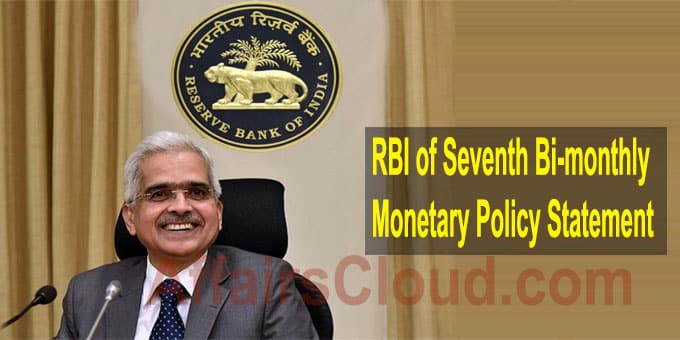On March 27, 2020, Reserve Bank of India (RBI) has released the Seventh Bi-monthly Monetary Policy Statement, 2019-20 Resolution of the Monetary Policy Committee (MPC), RBI under which MPC has decided rate changes with immediate effect due to the current and evolving macroeconomic situation impacted by COVID-19.
- The meet was scheduled for 31st March, 1st and 3rd April 2020 but they advanced its meeting on 24th, 26th and 27th March.
Following table showing the policy rate changed in 7th Bi-monthly Monetary Policy
[su_table]
| Policy rate | New Rate | Previous Rate | Change in Basis points (bps) |
| Policy Repo Rate | 4.40 % | 5.15% | 75 |
| Reverse Repo Rate | 4% | 4.90% | 90 |
| Marginal Standing Facility Rate | 4.65% | 5.40% | 75 |
| Bank Rate | 4.65% | 5.40% | 75 |
| CRR | 3% | 4% | 100 |
| SLR | 18.25% | 18.25% | – |
[/su_table]
Measures taken by RBI in FY19-20 for sound functioning of financial system:
-Cumulative reduction in the policy repo rate of 135 basis points.
-Two USD buy/sell swap auctions of USD 5 billion each conducted on March 26 and April 23, 2019, injecting liquidity into the banking system amounting to Rs 34,561 crore and Rs 34,874 crore, respectively.
-Seven open market purchases, injecting Rs 92,500 crore into the system.
-Four simultaneous purchase and sale of government securities under Open Market Operations (OMOs) during December and January (December 23 and 30, 2019 and January 6 and 23, 2020) to ensure better monetary policy transmission.
-Five long term repo operations (LTROs) between February 17 and March 18, 2020 for one-year and three-year tenors amounting to Rs 1,25,000 crore of durable liquidity at reasonable cost (fixed repo rate).
-Two 6-month US Dollar sell/buy swap auction providing dollar liquidity amounting to USD 2.71 billion.
–Variable rate repo auctions of Rs 50,000 crore and Rs 25,000 crore of 8 days and 3 days maturity on March 26, 2020 and March 31, 2020 respectively, with standalone primary dealers (SPDs) allowed to participate.
-Variable rate Repo auction of 16-day maturity amounting to Rs 81,585 crore on March 23-24, 2020.
-The amount under the Standing Liquidity Facility (SLF) available for standalone primary dealers was enhanced from Rs 2,800 crore to Rs 10,000 crore on March 24, 2020 and this will be available till April 17, 2020
RBI allows banks to put EMIs on hold for three months
RBI permitted a moratorium of three months on payment of instalments in respect of all term loans (retail loans and EMIs-Equated Monthly Installment) outstanding as on March 1, 2020. It means if a borrower is unable to pay their EMI for the next three months, the bank will not classify it as a non-performing asset (NPA). The decision has been taken to support the people who have home loans, car loans etc, and are facing pay cuts in the wake of the COVID-19 lockdown.
- This includes term loans taken from all commercial banks (including regional rural banks, small finance banks and local area banks), co-operative banks, all-India Financial Institutions, and Non-Banking Financial Companies (NBFCs) including housing finance companies and micro-finance institutions.
Static Points:
- Repo Rate: It is the rate at which RBI lends money to commercial banks.
- Reverse Repo rate: It is the rate at which RBI borrows money from commercial banks.
- Cash Reserve Ratio (CRR): The share of net demand and time liabilities (deposits) that banks must maintain a cash balance with the RBI.
- Statutory Liquidity Ratio (SLR): The share of net demand and time liabilities (deposits) that banks must maintain in safe and liquid assets, such as government securities, cash, and gold.
- Bank Rate: It is the rate at which the RBI is ready to buy or rediscount bills of exchange or other commercial papers for the long term.
- Marginal Standing Facility Rate (MSF): The rate at which the scheduled banks can borrow funds from the RBI overnight, against the approved government securities is termed as MSF.
About Reserve Bank of India (RBI):
Headquarters– Mumbai, Maharashtra
Formation– 1 April 1935
Governor– Shaktikanta Das
Deputy Governors– 4 (Bibhu Prasad Kanungo, N S Vishwanathan (will retire on March 31, 2020), Mahesh Kumar Jain, Michael Debabrata Patra).





